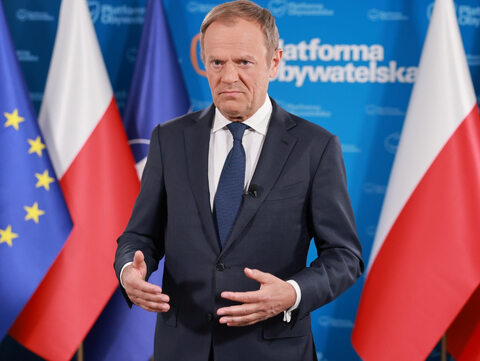Tusk: Poland considers expanding embargo on Ukrainian goods
Amid farmer protests, Poland considers extending embargo on Ukrainian goods.

In a recent statement in Prague, Polish Prime Minister Donald Tusk highlighted the possibility of expanding the national embargo on Ukrainian grain imports to encompass additional products.
In September 2023, despite the European Commission’s decision against extending the embargo, Poland, Hungary, and Slovakia took unilateral action to restrict Ukrainian grain imports, allowing only its transit to other countries through their territories.
“We are discussing that it would be possible to extend the embargo to other products if the EU does not find a more effective way to protect the Polish and European markets,” Tusk said.
Poland’s farmers have continued to block truck traffic at land crossings to Ukraine. Their demonstrations have included drastic measures such as dumping grain destined for other markets from a freight train. The agricultural community in Poland is advocating for the extension of the ban to cover a wider range of goods, including fruit, eggs, and meat, to protect their interests and ensure market stability.
EU ban on Ukrainian agricultural products
The EU imposed a ban on Ukrainian agricultural products in May 2023 as a temporary measure temporary measure “to avoid market distortions.” The decision followed unilateral bans in five EU countries bordering Ukraine, Poland, Hungary, Slovakia, Romania, and Bulgaria, in what has been called “blackmail” of the EU commission.
The ban only applied to domestic sales of Ukrainian wheat, maize, rapeseed, sunflower seeds, and sunflower oil, while allowing transit of such products for export elsewhere. It blocked over 14% of overall Ukrainian agricultural exports, dealing a blow to its wartime economy.
The EU lifted the ban on Ukrainian agricultural products on 15 September 2023, after Ukraine agreed to introduce legal measures within 30 days to avoid grain surges and ensure fair competition.
The EU also said that the market situation had improved and that the temporary measures had achieved their objective.
However, some EU countries, such as Poland, Hungary, and Slovakia, decided to extend their own national bans on Ukrainian products, citing the need to protect their farmers and food security.
Ukraine protested against these unilateral actions and threatened to seek arbitration from the World Trade Organization.
Read also:
- Media: Poland detains Ukrainian reporter investigating Russian trade
- Unprecedented: 160 tons of Ukrainian grain dumped in Poland
- Latvia bans agricultural imports from Russia, Belarus
You could close this page. Or you could join our community and help us produce more materials like this.
We keep our reporting open and accessible to everyone because we believe in the power of free information. This is why our small, cost-effective team depends on the support of readers like you to bring deliver timely news, quality analysis, and on-the-ground reports about Russia's war against Ukraine and Ukraine's struggle to build a democratic society.
A little bit goes a long way: for as little as the cost of one cup of coffee a month, you can help build bridges between Ukraine and the rest of the world, plus become a co-creator and vote for topics we should cover next. Become a patron or see other ways to support.



